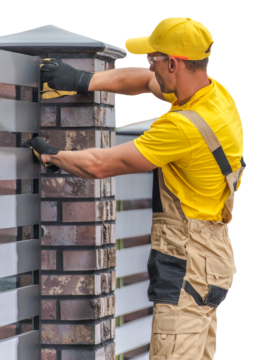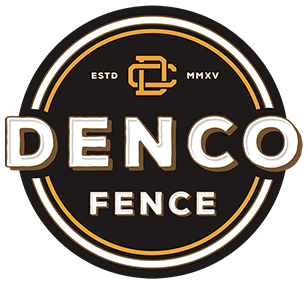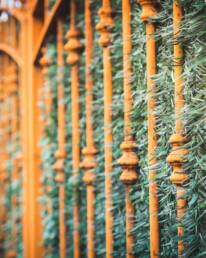Choosing the right fence for your Denver property is more than just a design decision—it’s about balancing security, privacy, aesthetics, and climate resilience. The unique weather conditions in Denver, including snowfall, wind, and temperature fluctuations, make it essential to select a durable fencing material. This guide will help homeowners explore the pros and cons of wood, vinyl, chain link, and metal fences to make an informed decision that suits their needs.
Factors to Consider When Choosing a Fence
When selecting a fence for your Denver property, several critical factors come into play that can significantly impact your decision. Careful evaluation of these factors will ensure the fence you choose meets both functional and aesthetic requirements while withstanding Denver’s unique climate.
Security Needs:
If security is a primary concern, consider fence designs specifically built to deter intruders.
- Taller fences, typically over six feet, with limited visibility, such as solid wood panels or vinyl fences, provide enhanced security.
- Security can be further increased with features like locking gates, reinforced panels, anti-climb designs, and motion sensor lighting.
- Chain link fences can also be effective when paired with privacy slats or topped with barbed wire for commercial or rural properties.
Privacy Requirements:
Privacy fencing is ideal for backyards, pool areas, and homes near busy streets.
- Solid wood fences with closely spaced slats, vinyl panels, or composite materials offer optimal coverage and noise reduction.
- Consider fence height regulations in your area to ensure compliance while maximizing privacy.
- Layering materials, such as combining lattice with a solid base, can provide both privacy and airflow.
Aesthetic Preferences:
The appearance of your fence should align with your home’s exterior and landscaping style.
- Wood fences offer a warm, natural appearance and can be painted or stained to match the home’s color scheme.
- Wrought iron and aluminum fences provide a sophisticated, ornamental look suited for formal gardens and historical homes.
- Mixing materials, such as stone columns with wooden panels, can create a custom aesthetic.
Budget Considerations:
Budget planning should include both initial costs and long-term maintenance expenses.
- Chain link and pressure-treated wood fences are among the most budget-friendly options.
- Vinyl and composite materials may have higher upfront costs but lower maintenance expenses over time.
- Factor in potential repair costs and the longevity of the material when planning your budget.
Local Climate and Durability:
- Denver’s climate includes heavy snowfall, freezing temperatures, and intense UV exposure, all of which can affect fencing materials.
- Wood can be susceptible to warping, cracking, and moisture damage if not properly treated.
- Vinyl and metal fencing, such as aluminum and steel, offer excellent weather resistance with minimal maintenance.
- Proper post-installation techniques, such as deeper post holes and concrete reinforcement, can improve durability against frost heave and wind damage.
HOA and Local Regulations:
- Many Denver neighborhoods have homeowners association (HOA) rules that dictate fence styles, colors, and heights.
- It’s essential to check local zoning laws and obtain any necessary permits before beginning installation.
- Failing to comply with regulations could result in fines or mandated removal of non-compliant fencing.
Considering these factors thoroughly will help ensure you select a fence that not only enhances your property’s appearance but also provides the necessary functionality for years to come.
Overview of Popular Fence Materials
Choosing the right fencing material is crucial for balancing durability, aesthetics, and cost. Below is an overview of the most popular materials used in Denver homes:
- Wood: Known for its classic appearance and natural beauty, wood fencing comes in options like cedar, redwood, and pine. It’s customizable but requires regular maintenance to prevent rot and weather damage.
- Vinyl: A modern option, vinyl fencing is virtually maintenance-free and resistant to pests and rot. Available in various styles and colors, vinyl fences are ideal for long-term investments but come with a higher upfront cost.
- Chain Link: Chain link fencing is a budget-friendly choice for security and pet containment. While durable and weather-resistant, it offers limited privacy and basic aesthetics.
- Metal (Aluminum & Wrought Iron): Metal fencing offers elegance and exceptional durability, especially with materials like aluminum and wrought iron. While low maintenance, it tends to be more expensive and provides limited privacy.
Comparing these materials will help homeowners balance cost, maintenance, aesthetics, and durability when choosing the right fence for their property.
Wood Fencing
Wood fencing remains a popular choice for homeowners seeking a timeless and natural look.
- Types: Cedar, redwood, pine, and pressure-treated wood
- Styles Available: Picket, privacy, shadowbox, split rail
Pros:
- Natural beauty that enhances curb appeal
- Customizable with paint, stain, and design variations
- Offers privacy and security depending on style and height
- Environmentally friendly, especially when sourced from sustainable forests
Cons:
- Requires consistent maintenance, including staining and sealing
- Susceptible to rot, insect damage, and weathering over time
- Higher maintenance costs compared to other materials
Climate Suitability:
- Cedar and redwood are more resistant to Denver’s moisture and freezing temperatures
- Pressure-treated wood helps prevent rot and insect damage
Best suited for:
- Classic homes seeking natural aesthetics
- Homeowners desiring privacy and moderate budgets
- Those willing to invest in ongoing maintenance for longevity
Vinyl Fencing
Vinyl fencing is a modern, low-maintenance option ideal for homeowners seeking durability with minimal upkeep.
- Types: Solid panels, picket, lattice, and decorative designs
- Styles Available: White, tan, gray, wood grain finishes
Pros:
- Resistant to pests, rot, and moisture
- Virtually maintenance-free with occasional cleaning
- Available in multiple colors and styles for aesthetic versatility
- Long-lasting and durable against weather conditions
Cons:
- Higher initial investment compared to wood
- Less eco-friendly due to synthetic materials
- Limited ability to repaint or customize
Climate Suitability:
- Excellent for Denver’s moisture variations and UV exposure
- Withstands extreme weather with minimal wear
Best suited for:
- Modern homes seeking low-maintenance fencing
- Homeowners wanting long-term durability and style
- Properties where pest and moisture resistance are priorities
Chain Link Fencing
Chain link fencing is a practical and cost-effective choice for homeowners prioritizing security and functionality.
- Types: Galvanized steel, vinyl-coated chain link
Pros:
- Highly affordable compared to other materials
- Durable and weather-resistant
- Effective for security and pet containment
- Easy and quick installation
Cons:
- Limited privacy without additional modifications
- Basic, industrial appearance
- Can rust over time without proper coating
Climate Suitability:
- Resistant to Denver’s moisture and temperature fluctuations
- Vinyl-coated options offer enhanced durability
Best suited for:
- Security fencing and property boundaries
- Pet enclosures
- Temporary fencing solutions
Metal Fencing (Aluminum & Wrought Iron)
Metal fencing is a durable, elegant choice often used for decorative and high-end properties.
- Types: Aluminum, wrought iron, steel
- Styles Available: Ornamental designs, vertical bars, flat-top
Pros:
- Elegant, timeless design ideal for upscale properties
- Highly durable and resistant to Denver’s weather conditions
- Low maintenance with protective coatings
- Adds curb appeal and property value
Cons:
- Higher upfront cost compared to other materials
- Provides limited privacy unless combined with other elements
- Some materials like wrought iron may require rust protection
Climate Suitability:
- Resistant to Denver’s snow and moisture when properly treated
- Aluminum resists corrosion better than wrought iron
Best suited for:
- Decorative fencing for upscale homes
- Homeowners seeking low-maintenance options
- Properties needing a combination of elegance and security
Climate Considerations for Denver Homeowners
Denver’s climate can be challenging for fence durability, requiring homeowners to consider materials that withstand various elements:
- Snow and Ice: Heavy snow accumulation and ice can add weight and strain on fences, making sturdy materials like vinyl and metal ideal.
- Freeze-Thaw Cycles: Fluctuating temperatures can cause expansion and contraction, leading to cracks in wood fencing if not properly treated.
- Sun Exposure: Prolonged UV exposure can fade and weaken wood and some vinyl varieties; choosing UV-resistant materials is recommended.
- Wind Resistance: High winds require secure installations and sturdy materials like metal or reinforced vinyl.
Maintenance Tips:
- Regularly inspect for damage
- Apply protective coatings for wood and metal
- Ensure proper drainage around fence posts
Installation Options
When installing a fence, homeowners can choose between DIY and professional installation services.
DIY Installation:
- Ideal for those with the necessary tools and experience
- Can save on labor costs but requires significant time and effort
- Mistakes in installation may lead to long-term issues and higher repair costs
Professional Installation:
- Ensures proper measurements, alignment, and secure installation
- Saves time and stress while providing expert craftsmanship
- Often includes warranties on both materials and labor
- Access to specialized tools and equipment for a high-quality finish
- Cost Breakdown and Budget Planning
When planning for a new fence installation, it’s important to consider all aspects of the cost to avoid surprises. Here’s a comprehensive breakdown to help homeowners budget effectively:
Material Costs:
- Wood: Typically ranges from $15 to $30 per linear foot, depending on the wood type (e.g., cedar, pine, redwood).
- Vinyl: Higher initial costs around $20 to $40 per linear foot but minimal long-term maintenance.
- Chain Link: Most affordable, ranging from $10 to $20 per linear foot.
- Metal: Aluminum and wrought iron can range from $30 to $50 per linear foot, reflecting their durability and aesthetic appeal.
Labor Costs:
- Professional installation typically ranges from $5 to $15 per linear foot.
- Factors influencing labor costs include fence height, terrain complexity, and fence design.
Permitting Fees:
- Some Denver neighborhoods require permits for certain fence heights and materials.
- Permit costs can range from $50 to $300 depending on location and fence specifications.
Maintenance Costs:
- Wood: Requires periodic staining, sealing, or painting, adding $100 to $300 annually.
- Vinyl: Minimal maintenance costs with occasional cleaning.
- Chain Link: Minimal maintenance but may require rust-proof coatings.
- Metal: Wrought iron may need occasional rust treatment and repainting.
Long-Term Considerations:
- Upfront investments in durable materials can save money on future repairs.
- Consider warranties and lifespan when budgeting; for example, vinyl and metal often come with extended warranties, while wood may require more frequent repairs.
Ways to Save:
- Opting for simpler designs can reduce material and labor costs.
- Mixing materials (e.g., wood and chain link) can create a balance between cost and aesthetics.
- Consulting professionals like Denco Fence can help identify cost-effective options without compromising quality.
Choosing the Right Fence for Your Needs
Choosing the right fence involves evaluating multiple factors to match your property’s unique requirements. Here’s a comprehensive guide to help you determine the best fence for your specific needs:
Security-Focused Fences:
- Best Materials: Chain link, metal (wrought iron, steel)
- Key Features: Taller heights, limited visibility, anti-climb designs
- Ideal Uses: Perimeter security, preventing unauthorized access
Privacy-Focused Fences:
- Best Materials: Wood (solid panels), vinyl (solid designs)
- Key Features: Height between 6-8 feet, minimal spacing between panels
- Ideal Uses: Backyard spaces, pool areas, residential privacy
Aesthetic Appeal:
- Best Materials: Metal (wrought iron, aluminum), wood (decorative picket)
- Key Features: Ornamental designs, customizable styles, high-end finishes
- Ideal Uses: Enhancing curb appeal, garden enclosures, decorative boundaries
Budget-Friendly Options:
- Best Materials: Chain link, basic wood
- Key Features: Basic design, standard height
- Ideal Uses: Large property boundaries, temporary fencing, pet enclosures
Low-Maintenance Needs:
- Best Materials: Vinyl, metal (aluminum)
- Key Features: Weather-resistant, rustproof, minimal cleaning
- Ideal Uses: Homeowners wanting minimal upkeep
Environmental Considerations:
- Best Materials: Bamboo, composite, sustainably sourced wood
- Key Features: Eco-friendly, biodegradable, durable
- Ideal Uses: Green building projects, eco-conscious homeowners
Wind Resistance:
- Best Materials: Metal, vinyl (reinforced)
- Key Features: Strong post anchoring, wind gaps for airflow
- Ideal Uses: Windy areas, open landscapes
Final Considerations:
- Evaluate your property’s terrain and local climate when selecting materials.
- Consult with professionals like Denco Fence for personalized recommendations.
- Choose a fence that balances functionality, aesthetics, and budget for long-term satisfaction.
Conclusion and Next Steps
Selecting the perfect fence for your Denver property involves careful consideration of multiple factors, including security, privacy, aesthetics, climate resilience, and budget constraints. By understanding the benefits and limitations of each fencing material, you can make an informed choice that complements your property while meeting your functional needs.
Recap Key Points:
- Wood fencing offers classic aesthetics but requires ongoing maintenance.
- Vinyl is a durable, low-maintenance option suitable for modern properties.
- Chain link provides budget-friendly security but limited privacy.
- Metal fences, such as aluminum and wrought iron, offer durability and elegance but come with higher upfront costs.
Next Steps for Homeowners:
- Assess Your Property’s Needs: Identify whether security, privacy, or aesthetics is the priority for your space.
- Set a Budget: Determine your financial limits and compare material and labor costs.
- Research Local Regulations: Check for HOA restrictions and permitting requirements in your neighborhood.
Why Choose Denco Fence:
- Expert Guidance: Our experienced professionals can help you choose the ideal fence based on your unique property requirements.
- Quality Materials: We offer a wide range of high-quality materials suited for Denver’s climate.
- Professional Installation: Ensure lasting results with our expert installation services.
- Customer Satisfaction: Dedicated to ensuring each project exceeds expectations, backed by warranties and ongoing support.
Schedule a free consultation with Denco Fence today to explore personalized fencing solutions.
Visit our website or call our office to learn more about our services and request a custom quote.
Investing in a professionally installed fence can significantly enhance your property’s security, value, and visual appeal. Let Denco Fence assist you in making the best decision for your home.

Need an expert opinion? Talk to our experts today!
When you talk to our experts at Denco Fence Company, we’ll help you compare fence styles, share design ideas, and answer any questions along the way. If you’re looking to build or repair a fence that you and your neighbors are going to love, get a free estimate and let us help bring your project to life.

